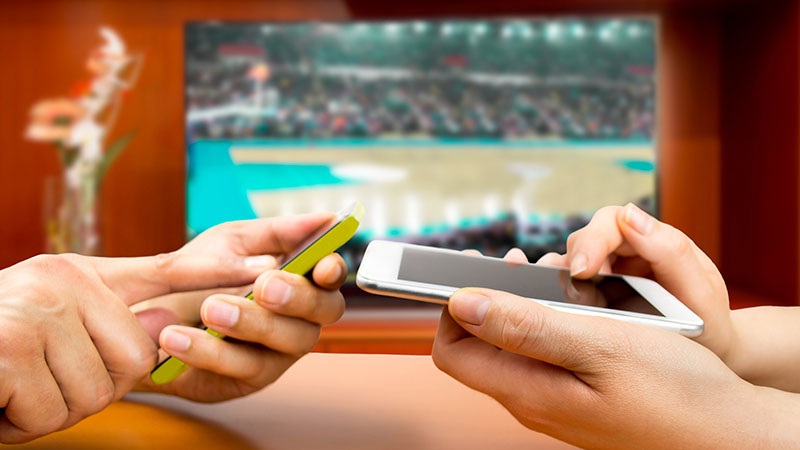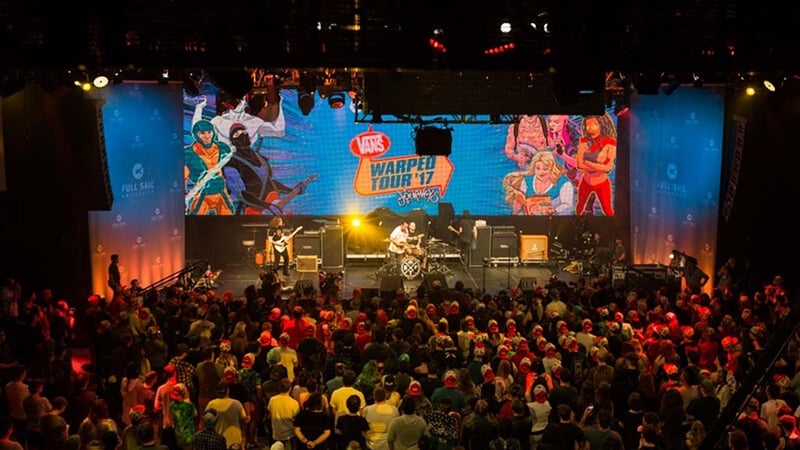Full Sail
A Life in Sports: RaeLynn McAfee's Journey from Athlete to Educator
As program director for Full Sail University's Sports Marketing & Media and Game Business & Esports bachelor's degree programs, RaeLynn McAfee draws upon her own diverse background to help shape her students' educational experience. From her time as a student-athlete to marketing roles at the collegiate and professional level, as well as time spent balancing her own career and personal life with her continuing education, RaeLynn's path to her current role is grounded in the sort of practical, industry-relevant perspective she hopes students gain from their studies.
We sat down with her to talk about her career journey, her educational philosophy, and why "doing the work" is the most important thing when it comes to a successful career in the business of sports.
When did you first become interested in sports?
I started playing sports at a young age; I started playing basketball when I was in third grade, but only because my brother had played when he was in third grade. I was not going to let him do something and I couldn't do the same thing, so I might've been a little competitive. [laughs]
I picked up other sports as I got older, and I played volleyball and soccer. I ran track through high school. So athletics and sports was definitely a big piece of my life.
Let's talk about being a student athlete. Did you play on high school teams?
Yes. I was a three-sport athlete in high school: volleyball, basketball, and track. I knew basketball was going to be my sport, but I wanted to do it all. If I could've, I probably would've played soccer as well, but [the season was] at the same time as volleyball. I ended up playing a lot of AAU basketball, which helped me get in front of college coaches, and I was recruited pretty heavily throughout the Midwest.
Did you get a scholarship?
I did. I was offered a full ride. I was actually offered several. I decided to go the University of Dayton. The reason to go there was a mixture between the team, the coach, and the school itself. I was a communications major – I wanted to go into sports broadcasting – and they had a great communications school that Dan Patrick went to as well. He actually played basketball there too.
So, after graduation, you took an unpaid internship with an arena football team, correct?
Yes. When I graduated, I thought, "Okay, now it's time to get a job in the 'real world.'" For about six or seven months, I was applying to marketing agencies or other companies in sales and marketing. I had decided in college that I didn't want to go down the broadcasting route, so I focused on the marketing, but I wasn't finding anything that I had any passion for. Someone one day just said, "Hey, why don't you do marketing for sports?" and it was truly an epiphany of, "Oh, I can do this!"
So, I started applying for jobs with sports organizations. The first that stuck was an unpaid internship with the arena football team in Indianapolis.
Were you doing marketing work for them?
I started out in community relations, which is grassroots marketing. It was a new team, so it was taking everyone out and just branding the city. I really enjoyed that, and then I got hired on full time from that internship into the director position for community relations.
So you went from unpaid internship to full-time director position. How did you prove yourself?
Great question. I worked in the unpaid role for about six months. I came in every day even if I didn't have to or they didn't need me, and I would just learn more. I would offer to do things that no one else wanted to do. I would just pick up whatever needed to be done. I added value to the team, and I was doing it for free because that's just what I had been taught.
It was a small front office, but over that six months I also took on all of the role of basically the office work for the community relations, setting up the appearances, making sure that we had all of the logistics set up for any type of events.
So, that's the secret: "Do the work."
Right! Just bring value to the team or organization even when they aren't asking you to do something. It was just piecemeal finding skills or knowledge that I needed on my own time.
So, from the arena football team, you took a role at Virginia Tech, which must have been a unique transition.
Going from a professional team – where you have one sport and one season – to a college – where you have typically, depending on the college, anywhere from 12 to 20 sports, multiple seasons that cross over and overlap, and you have amateur athletes – there are a lot of different opportunities and a lot of different challenges.
So I started at Virginia Tech as an assistant director of marketing. I had something like 14 sports that I was working with. Most of them were what we called Olympic sports, your soccer, your swimming and diving, wrestling, softball.
Then over several years that I was working there, I would switch to different sports and, eventually, I took the director of marketing role and took on some of the bigger sports.
Within that college athletic department, what are some of the differences between, say, handling marketing for the Olympic sports and a football team?
There's definitely a difference. My job with the revenue sports like football was more dependent on fan engagement aspects, while the work with the Olympic sports was focused heavily on getting butts in seats, and then once they did, making sure that they did have a good time.
While you were working at Virginia Tech, you also got your master's degree, so you probably understand a little bit about students balancing work and school.
Absolutely. I have a lot of empathy for our students because I have been there and done that. I was married; I didn't have kids at the time, but the family, the work, the amount of hours and time that I spent with work and night events, and then making sure to make school a priority. My schedule was not as probably demanding as a Full Sail student's, but it really was about the organization and the time management aspect.
What's the main thing you hope graduates take with them from this program?
The biggest thing I hope the students walk away with from our program is seeing sports as a business and understanding how the business operates and where they make an impact within the industry amongst many roles.
We're teaching them all those fundamentals, and the hope is that they walk away with not only the understanding of the business but that their hands have been dirty, that they have now seen areas they do and don't want to work in.
This can be kind of like their small front office at an arena football team.
Exactly! I talk about it all the time. Each of our classes, you can pretty much take the class title and assign it to a different department in the front office of an organization.
Learn more about Full Sail University's Sports Marketing & Media, Game Business & Esports, and Sportscasting bachelor's programs by visiting fullsail.edu.
Whether you’re ready to apply or just want to learn more about Full Sail University, our Admissions Representatives are here to help. Call us or request more information.

